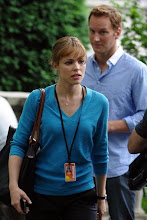For my outside film viewing, I watched a couple of documentaries on issues pertaining to Israel and a film titled The Band’s Visit.
The most interesting documentary that I watched was one titled Women of the Wall, a documentary that I picked up at the WMU library. This is a film chronicling the struggle for women’s rights in the state of Israel, particularly women’s rights to pray in public at the famous Kotel, or Western Wall. The women in the film go against tradition by wearing the prayer rug and other religious articles that only men traditionally wear, and by carrying and reading from the Torah. Before this film, I did not know much about these Jewish traditions, and did not realize that Jewish women still did not have as many religious “rights” as Jewish men. The women in the film meet once a month to pray as a group at the wall, even though it is against the law. When I looked to see if women had been granted these rights since the time of the film (made in 1999), I discovered that they had not, though they continue to meet once a month and on certain other holidays, such as Purim. The Supreme Court in Israel had actually granted them these rights for about four days, but the state overruled the court; now women’s communal prayer is “punishable by a fine and seven years in prison.” (see link below) These facts were very surprising to me, since I had thought that women enjoyed equality in Israel. Some fascinating information about the Women of the Wall group can be found at this link: http://www.jewishvirtuallibrary.org/jsource/Judaism/WOW.html
The film The Band’s Visit is about an Egyptian police orchestra that is invited to perform at an Arab culture center in Israel. The band members have trouble pronouncing the “p” sound, and end up in a different town than they plan because of mispronouncing the town’s name (Arabic has no “p” sound, only a “b” sound.). The band members end up staying with some locals in the small town, and the story is a tender portrayal of the humanness of the Egyptian and Israeli people. The traditional strife between the two cultures is somewhat eliminated by the sharing of music, and by interacting with one another on an individual basis.

These both sound very interesting and a good portrayal of what women and others go through in Israel. This may be worth discussing in our group project, or at least bringing up the ideas about women and how they are affected. I know our movies mostly deal with what the men go through, but I think it would be beneficial to talk about these types of topics as well. (if we have time!) What do you think?
ReplyDeleteI am really interested in this, and I am very excited about our upcoming "Women in the Middle East" group. It is fascinating what sorts of interesting tales we can find when people are faced with constant oppression. This sounds like a great movie.
ReplyDeleteI would like to put some of your comments about this film in the book!
ReplyDelete